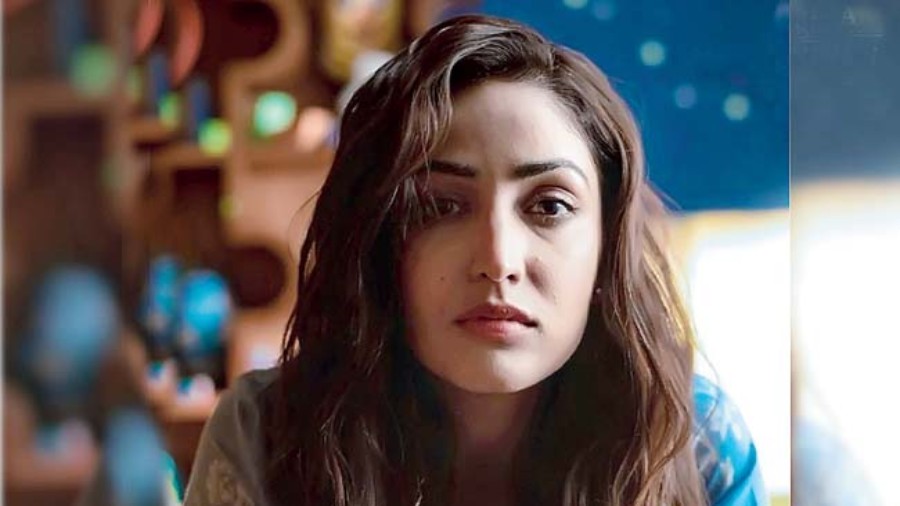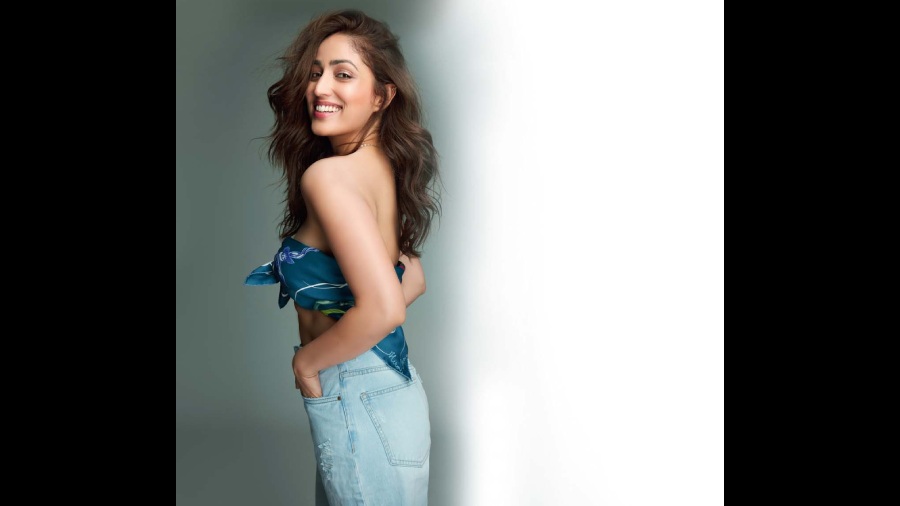Over the last few years, Yami Gautam Dhar has been going from strength to strength with almost every film. The actor now throws a curveball with her grey protagonist in A Thursday. The thriller, now streaming on Disney+Hotstar, has Yami in the role of a playschool teacher who holds 16 tiny tots hostage. The Telegraph chatted with Yami on the challenges of being cast against type, her turning point and what it feels to have another creative person — her film-maker husband Aditya Dhar — in the house.
A Thursday may have opened to mixed reviews, but your central turn has come in for near unanimous praise, also because one hasn’t seen you play such a grey, chilling character before. Was that the major reason to sign on?
The idea was always to keep working, to make a place for myself in this industry and be a part of films that nurture me. I want to do parts that give me as much diversity as possible. My aim is that one shouldn’t be able to associate just one genre with me. It should never be, ‘Oh, this film is of this genre so let’s get Yami.’ It should be anything and everything.
Since last year, there has been a shift for me. Things started rolling in the direction where I could give a voice to my choices. I now have work that I can talk a lot about. I am glad that I am getting to be a part of films that start a conversation. A Thursday is a big example of that.
When we had spoken last year just after you wrapped up your film Lost in Calcutta, you had told me that you never judge the people that you play. Was that tested a lot with Naina in A Thursday?
Yes, it was! I always knew that I never wanted to judge Naina at all. But there have been mothers who have told me, ‘Oh my God! We love Naina, but we send our kids to school every day and this scares us! Why, why?!’ (Laughs) One needs to be open to every kind of reaction, especially in today’s times. But I was very certain that this is something I really want to do. As an actor, I can only perform my part; I don’t hold any judgment regarding her. I played her with full conviction and I am a firm believer in the fact that this story needs to be told. I believe that the kind of films that I am now doing subtly underline the new-age empowerment of women that we talk about.
I want to be part of conversations through my films, but in a cinematic way. At the end of the day, my medium is cinema. A story highlighting an issue isn’t enough. A film has to speak to the viewer, a majority of the audience. For it to work, a film has to connect. That has to be kept in mind. Cinema is a very powerful medium and can be used very effectively.

I had really absorbed Naina (in A Thursday) into my system. Not only did I step into her shoes, I made her, lived her, shaped her.... It wasn’t easy. It required a lot of mental, physical as well as technical prep. Lot of nuances had to be mastered, it was also important not to overdo things because one can cross the line when it comes to a character like this.
You have played characters strong on emotions in the part. Was being Naina different from the rest?
Very, very different... I felt her weight on my body. To the extent that it made me question if I was feeling well or not. Even the walk to my (vanity) van, which was just about 10 steps, felt much longer. I felt very heavy and that’s because of the way I had prepped for this part. Even in life, emotional weight can feel far heavier than that of weights in the gym. I had really absorbed Naina into my system. Not only did I step into her shoes, I made her, lived her, shaped her.... It wasn’t easy. It required a lot of mental, physical as well as technical prep. Lot of nuances had to be mastered, it was also important not to overdo things because one can cross the line when it comes to a character like this. I had to find the balance and that took a lot of homework.
I normally have handwritten notes for my characters, I put question marks against them.... I had to visualise Naina before I went on set and that was very heavy for me. But the role demanded it.
In retrospect, was it a good weight to have?
It was important. As much as it was challenging, it was important. That’s because you can’t cheat certain emotions. You have to be true to that moment... that moment between ‘action’ and ‘cut’ has to be true, no matter what emotion you are playing out. We also had to figure out how much the audience needs to know about Naina and at what point of time... that balance was important. That pressure was hard, it drained me a lot, but ultimately it was worth it. Playing this character needed every bit of me to be there.
You have just said that you are now in a position where you can give voice to your choices. What would you count as a turning point?
It’s been a gradual process. There have been times which have been a breaking point for me and I would think that this is not what I signed up for. I wasn’t prepared for this. There were moments, but the idea was never to give up. I knew I had to keep coming back, keep coming back.... I had to keep marching on even when I was crawling on some days. I would be feeling a certain way on a particular day and yet I had to flash my brightest smile at an event. But that’s life, you have to and you don’t give up.
So it wasn’t a gradual process. My definition of success — and we all have our definitions of it — is achieving whatever I have set out to, but retaining who I am. I am not a very social person, I am not someone who is very comfortable with the idea that one needs to attend parties to be seen, that I need to socialise... that doesn’t come naturally to me and I feel very awkward (smiles). That’s me, I can’t change. But now I do have the confidence to walk up to a director and say that I would love to work with them, and mean it. But the whole pressure of being social to move forward in this industry... that I couldn’t wrap my head around. That’s something I wasn’t okay with. I wanted to achieve things through my work and my patience, and I think Uri and Bala were the films that were a turning point for me. Those films led to the opportunities that I have today.
I was speaking to Shoojitda (Sircar, who directed Yami in her debut film Vicky Donor) and he told me, ‘Yami, I am very happy for the kind of work you are doing. But, most importantly, make sure you feel nurtured with every film.’
What is it like with two creative people living under the same roof?
I am so fortunate to have Aditya (Dhar) as my life partner. His creative vision is... oh my God! His mind, his vision, his awareness, his experience is something I value. We value each other’s opinions, but eventually, it’s our respective work and we do what works for us. One thing that Aditya keeps telling me is that I should try and think like a director. He feels one needs to think beyond being just an actor, and think about what works in totality for a film.
He’s very supportive of what I do. We had a screening for A Thursday yesterday and he was waiting up for me till 1.30am to know what everyone’s reactions were. He was so excited. We come from similar backgrounds. We both aren’t from Mumbai and we have had our challenges. I like how he’s made it on his own, keeping his ethics and core values intact.











